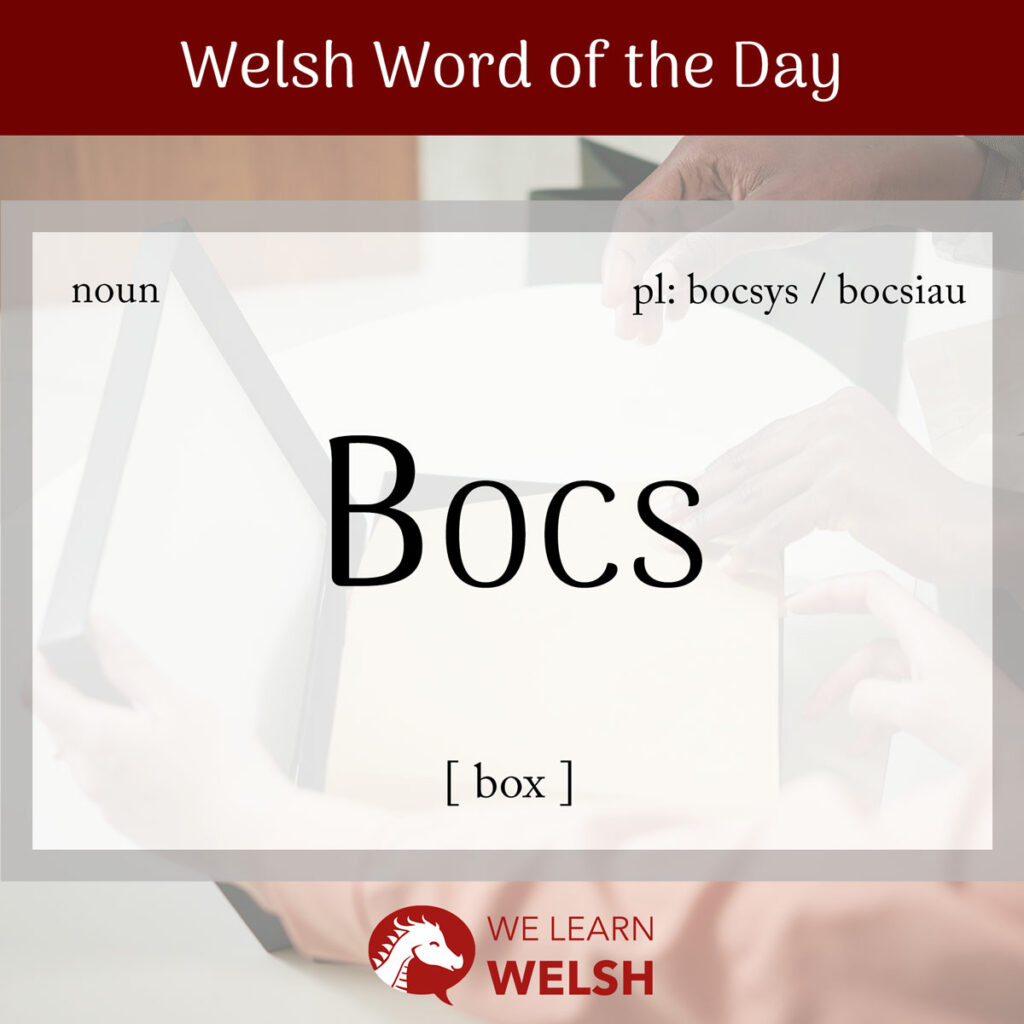When I was about eight or nine, one of my friends from England came to stay with my family and me during the school term, and she even came into school with me for one day. It was definitely a very confusing day for her, as all our lessons were in Welsh! I’m not sure she retained much– but when I saw her recently she told me the one phrase she still remembers is bocs bwyd (lunchbox).
Each morning when our names were read out on the register, my classmates and I were expected to respond yma (here) and then either bocs bwyd or cinio (school dinner), which would then be sent to the bwyty (cafeteria) so they knew how many meals to prepare.
As we had lunchboxes, my mum had taught my friend to remember to say bocs bwyd when the athrawes (female teacher) called her name. She was very nervous and had to keep repeating it to herself all morning! So, in honour of my poor confused English friend, today’s word of the day is bocs. The plural form is bocsys or bocsiau.
bocs
box
Bocs is obviously a borrowing from English, but unlike many such words it’s actually been used in Welsh for a long time – at least since the 1500s – and is also used in other Celtic languages, like Cornish, where it’s spelt just like the English box.
One thing I love about Welsh is that whenever we borrow words, we make them our own. Since Welsh doesn’t use the letter x, it’s been replaced with the cs spelling.
This isn’t the only word where this particular change has occurred. Tacsi from taxi, pocs from pox, and tocsin from toxin all follow the same pattern.
Another example is the man’s name Macsen, which is the Welsh form of Max. This is how we translate colloquially Magnus Maximus, the name of the Roman emperor who is viewed by many as the first leader of Wales. He’s referenced in the rousing patriotic song Yma o Hyd (Still Here), which begins with the phrase Dwyt ti’m cofio Macsen (You don’t remember Max).
And we often Welshify loanwords by making them subject to mutations. Granted, some more recent borrowings don’t respond to mutations at all, but bocs isn’t one of those. It mutates just the same way any other Welsh word beginning with b would.
Soft mutation
focs
Nasal mutation
mocs
Aspirate mutation
N/A
So something that comes from a box is o focs and my moneybox is fy mocs arian.
If you prefer not to use loan words, you can always go for blwch instead, which really has the exact same meaning. However, in my experience, blwch isn’t the go-to word these days, with bocs actually being a lot more common. I would only use blwch if I was speaking very formally, or if I was describing a box or space to fill out on a ffurflen (form).
Another slightly less direct, literal context in which blwch tends to be used rather than bocs is when we’re talking about IT. Your email outbox is your blwch allan, a dialogue box is a blwch dewis, and blwch neges is message box.
The synonyms don’t stop there. Crât, which means crate, and cist, which is really chest, can both be used in quite a few circumstances where you could also use bocs or blwch. In particular, you might use cist as an alternative to siwtces (suitcase). We can use the diminutive form cisten to talk about a relatively small chest.
Diminutive forms in Welsh can apply to bocs itself, so you’d likely use bocsen to refer to a small box.
Wyt ti eisiau bocs mawr neu fach?
Do you want a big or a small box?
Bocs is a masculine noun, and as I mentioned, it has multiple plurals – one borrowed directly from the English plural, bocsys, and one that follows one of the most common Welsh plural patterns, bocsiau. Much more rarely, bocysau might be used.
Aside from a bocs bwyd (which literally, means food box) these are the other types of bocsys you might want to talk about:
- bocs postio = post box
- bocs matshys = matchbox
- bocs tŵls = toolbox (also cist offer / cist dŵls)
- bocs gemwaith = jewellery box
- bocs o jocled = box of chocolate
- bocs anrheg = gift box
- bocs pasbord / bocs cardbord = cardboard box
- bocs sebon = soapbox
Bocsys can be made from a range of materials from pren (wood) and pasbord (cardboard), to metel (metal) and plastig (plastic). And sometimes, especially in a very casual sense, Welsh people use bocs to talk about other kinds of llestr (container). In fact, bocs is the default word for a container – the direct translation llestr which I’ve just given is very formal.
We might say bocs when we really mean a tun (tun), pot (pot) or can (can), as in bocs pupur (pepper pot) or bocs o ffa pob (can of baked beans).
On the other hand, we can’t use it as a verb as we would in English when we say to box up. Instead, we have to be a bit more long-winded – rhoi mewn bocs or dodi mewn bocs (to put in a box) will do the trick.
Mae angen i ni roi’r dillad mewn bocsys.
We need to put the clothes in boxes.
Bocsys of all shapes and sizes certainly come in handy in day-to-day bywyd (life), in situations from tacluso (tidying up) to newid tŷ (moving house). Can you make a sentence using bocs in our Facebook group?


